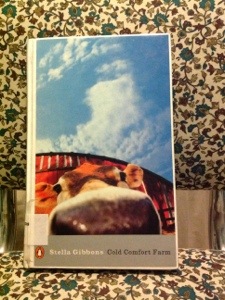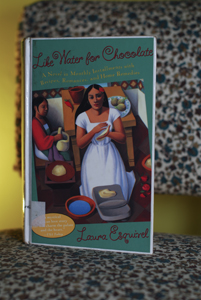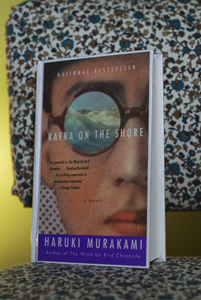This story follows several generations of an unusual family: Rosa, the girl with green hair who was too beautiful to live long, Clara, her precocious younger sister, who moves objects with her mind and stops speaking for nine years, Esteban, the choleric self-made man who loved both sisters, whose dark character brings ruin to his family. This saga covers love and hatred, indifference and revenge. The family is divided by politics. The women (grandmothers, mothers and daughters) are all full of an eccentric brand of common sense and are never thrown by drama. Nothing is ever as bad as it seems.
Love in a Cold Climate
Fanny, our main character, is just a device to view the story.
The book focuses on Lady Montedore and her daughter Polly. Polly is the still-waters-run-deep type. Silent about her dreams, grumpily submitting to her mother’s plotting.
Lady M is social shark, always moving to keep alive. Reading gossip, throwing parties, name-dropping.
Polly finally rocks the boat. How?
Though Fanny is boring, her family is hilarious. Her one uncle puts names of people he wants to die in drawers, hoping to kill them telepathically. Her other uncle keeps trying oddball health cures. Her 2 cousins are realistic teenage specimens, with inside jokes galore.
Cold Comfort Farm by Stella Gibbons
Flora Poste, our heroine, suitably orphaned and penniless, goes to live with distant relatives on a gloomy farm ruled by a despotic matriarch. Flora should be despondent, but this is not that kind of novel. Flora faces drama undaunted, armed with savoir vivre and common sense. Shades of Maria or Mary Poppins.
The book cleverly apes the characters who commonly flourished in brooding “agricultural” novels, then deftly turns them on their ear with a character who sees through everything. Flora’s a tourist on the set of a Dracula movie, busily brushing away cobwebs and making candid asides about the corny script.
The Wind-Up Bird Chronicles by Haruki Murakami
If you’re reading a book by Murakami and someone asks you what it’s about, say “It’s hard to explain.”
Toru’s wife disappears and he searches for her by sitting in pitch darkness in a dried-up well, where he also accesses a dream world. He is contacted by a mixed-bag of oddballs: a retired military man, a woman who knows things, a psychological tailor and her mute son, a teenage neighbour who works for a wigmaker, not to mention his wife’s evil bother. These characters seem scarred or they have icky monsters deep inside their psyches.
It was too dark for me.
The Thirty-Nine Steps by John Buchan
 This book was nothing more than a Choose-Your-Own-Adventure book without the choices. Buchan details too precisely each step his hero takes to elude his would-be capturers.
This book was nothing more than a Choose-Your-Own-Adventure book without the choices. Buchan details too precisely each step his hero takes to elude his would-be capturers.
The plot? Cliché-city! Richard Hannay: an out-of-work soldier. A mysterious American appears, begging for help, fearing for his life. The man is killed and Richard–unable to turn to the police as he is the prime suspect–flees with the American’s coded diary, assuming various disguises to outwit the murderers, a faceless group called Black Stone.
Hannay is an early version of all our spy heros, but one-dimensional, a bit too capable and a mite too lucky. Forgettable.
Murder Must Advertise by Dorothy Sayers
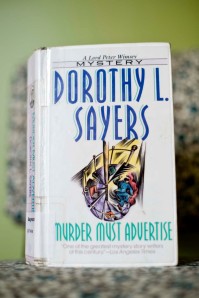 I liked it better than the other Dorothy Sayers.
I liked it better than the other Dorothy Sayers.
Lord Peter goes undercover at an advertising agency to investigate a suspicious death. He finds he has a knack for copywriting, as well as solving mysteries. My favourite scenes are the ones devoted to the ad agency, its office workers and their work. It’s like Mad Men but more innocent. The murder investigation becomes a hunt for drug dealers. Fun parts: Lord Peter has to bluff his way out when his undercover and real lives clash. Dumb parts: Lord Peter is too perfect: a friendly, flawless Sherlock Holmes. And there’s no Bunter.
The Poisonwood Bible by Barbara Kingsolver
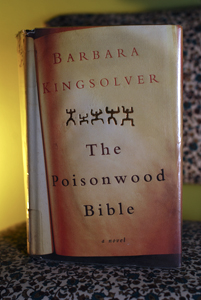 At the cusp of the Congo Crisis, an oblivious missionary family arrives in the village of Kilanga.
At the cusp of the Congo Crisis, an oblivious missionary family arrives in the village of Kilanga.
Nathan Price, the father, is aggressive and unbending, confident he is bringing enlightenment to Africa. The rest of the family is pulled along in his wake: an overshadowed wife and four daughters, each one different. Rachel, the superficial highschooler, Leah, the idealistic and strong twin, Ada, the cynical and crippled twin, and Ruth, the baby. The story follows each family member as they meet Africa (a thriving, cruel, smothering, surviving and liberating entity). Africa erodes Nathan’s power but does it really set his family free?
Like Water for Chocolate by Laura Esquivel
A recipe book for disaster, this fable tells of Tita, born and raised in the hot comfort of a kitchen. But Tita’s mother denies her the liberty of marrying Pedro. Only through her cooking can Tita express her passion: a love as dangerous as a hot stove. One meal causes her sister’s clothing to spontaneously combust!
I didn’t connect with any of the characters because they were so exaggerated. I didn’t want to care about them because the author seemed to take their fates so lightly. Magic realism? Not sure I like it. Not sure about the recipes in this book either.
The Things They Carried by Tim O’Brien
It’s literally a book of war stories. But it’s also a book about war stories.
What makes a war story true? The facts? Or the fable? O’Brien says a tall tale can be more true than what actually happened. Maybe because exaggeration better satisfies the need to communicate feelings.
O’Brien blends fiction and truth about the Vietnam war till you learn to hear the stories without caring about specific facts.
This book is about experiencing war. And telling about that experience through stories.
It’s obscene and poetic, violent and emotional. What did the soldiers carry? More than I have.
Kafka on the Shore by Haruki Murakami
In one thread of this story, Kafka, a mature 15-year-old, runs away from home to escape a dark prophecy. He is intelligent but troubled. So he hides in a library where he meets a woman who lives in her memories.
The other thread is Nakata, an elderly simpleton, who is neither intelligent, nor troubled. Mr. Nakata can talk to cats. As he searches for a lost cat, he finds himself drawn despite himself into a courageous quest. Can Kafka run from his destiny? Or must he and Nakata act out their destinies to keep the universe from going awry?


